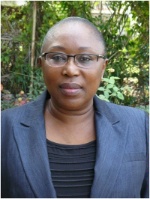Béatrice Epaye
Emilie Béatrice Epaye , mostly Béatrice Epaye , (* 1956 in French Equatorial Africa ) is a Central African politician, teacher and human rights activist. She has already served the country as a minister and a member of the National Assembly.
Life
Béatrice Epaye was born around 1956 in what was then the French colony of French Equatorial Africa . After completing school, Epaye trained as a teacher. Instead of working as a teacher, however, she and relatives founded a small transport company that she ran.
In 2000 the former wife of the President Ange-Félix Patassé , Lucienne Patassé, died . In 1994, Patassé founded the La Fondation la Voix du coeur , which mainly looked after street children in Bagui. Epaye then took over the management of the foundation and continues to manage it today.
Political career
In 2003, General François Bozizé overthrew then President Patassé in a military coup, and subsequent elections confirmed Bozizé in the presidency. Among other things, Bozizé set up a politically broad-based transition council and commissioned it to draft a new constitution. Epaye has been appointed chairman of the Foreign Affairs Committee of the National Assembly and a member of the transitional council established by Bozizé. In 2005 she moved to the Bozizés government, where she took over the department for trade, industry and small and medium-sized enterprises. She headed the department until 2011.
In addition to her political tasks under Bozizé, Epaye also represented the Central African Republic in international organizations. From 2003 to 2005, Epaye was a member of the Interparliamentary Commission of the Central African Economic Community (CEMAC). She also led the organization Africaine de la Propriété Intellectuelle (OAPI) for a time (from 2008) and led the first African conference on intellectual property in Dakar. During her time as minister, she also represented the Central African Republic in the Council of Ministers of the Central African Community.
After Bozizé was overthrown by the Muslim rebel group Séléka and the civil war that followed, the leader of the Séléka, Michel Djotodia , appointed himself president. After he resigned under pressure from the UN Security Council, the African Union and the French government, a transitional government was appointed, of which Epaye was a member.
Awards
In 2010, Epaye received the Medal of Grand Officer of the Central African Economic Community for her services to the Central African Economic Community.
In 2015, the US State Department presented Epaye with the International Women of Courage Award . Epaye was presented with the award in Washington.
Individual evidence
- ↑ a b La Voix du coeur, dernier refuge des enfants de la rue de Bangui. In: Panapress.com. June 27, 2001, accessed November 6, 2016 (French).
- ↑ a b Crisis in the Central African Republic. National Endowment for Democracy, Sept. 27, 2013, archived from the original on Nov. 3, 2013 ; accessed on November 6, 2016 .
- ^ OAPI: Communiqué de presse. Organization Africaine de la Propriété Intellectuelle, 2008, accessed on November 6, 2016 (French).
- ↑ Andrea Paracchini: BÉATRICE EPAYE: LA TRANSITION EN CENTRAFRIQUE A PIÉTINÉ, MAINTENANT LA RELANCE. In: Altermondes.org. September 24, 2014, accessed November 6, 2016 (French).
- ↑ Biographies of 2015 Award Winners. (No longer available online.) US Department of State, 2015, archived from the original on June 21, 2018 ; accessed on November 6, 2016 . Info: The archive link was inserted automatically and has not yet been checked. Please check the original and archive link according to the instructions and then remove this notice.
| personal data | |
|---|---|
| SURNAME | Epaye, Béatrice |
| ALTERNATIVE NAMES | Epaye, Emilie Béatrice (full name) |
| BRIEF DESCRIPTION | Central African politician, teacher and human rights activist |
| DATE OF BIRTH | 1956 |
| PLACE OF BIRTH | French Equatorial Africa |
